Trying to figure out how to thicken soup? You have come to the right place!
I have several excellent thickening methods- from adding a slurry to sneaking in veggies. And these are eight of my favorites!
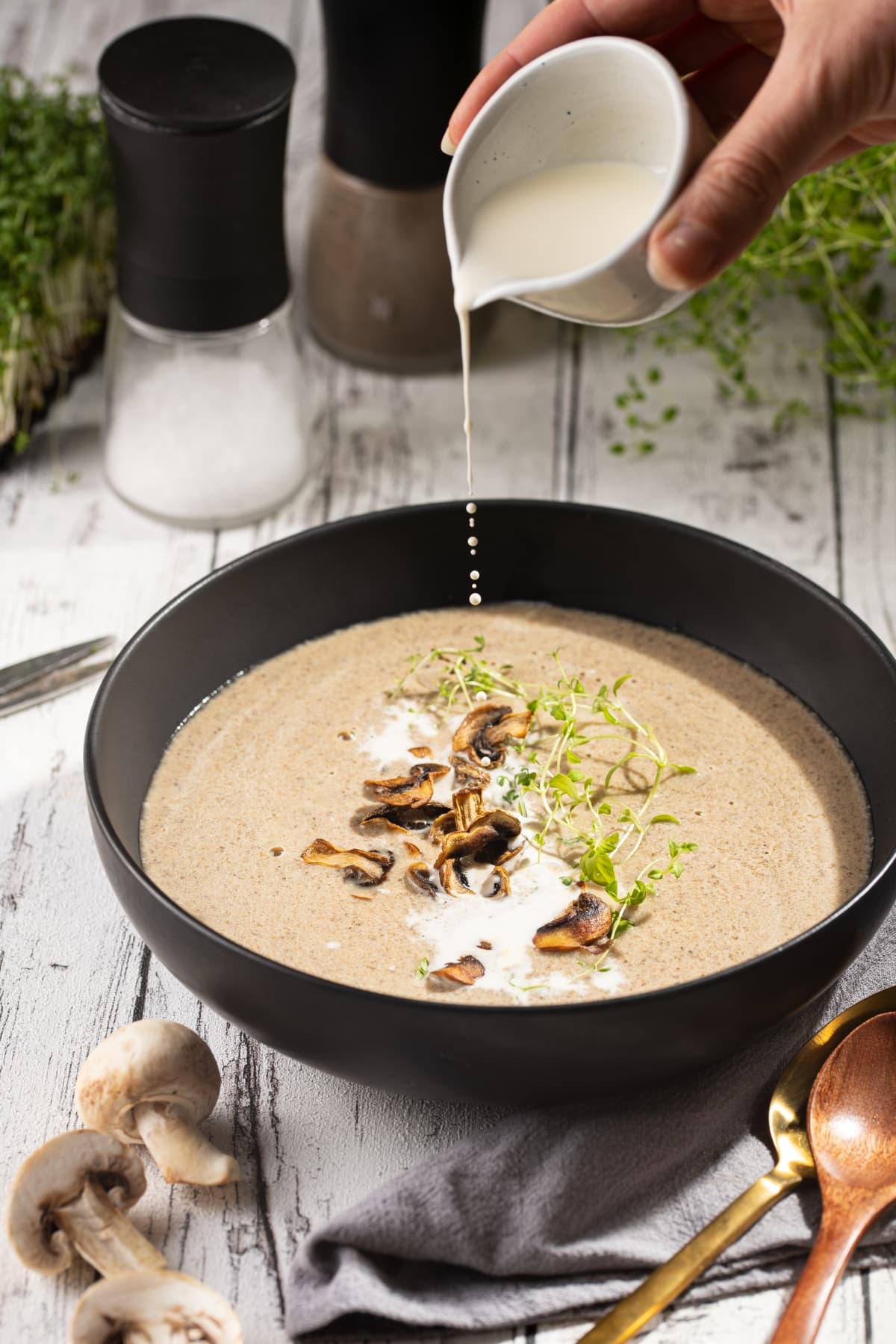
Finding the right balance between too thick and too thin isn’t always easy. Let alone trying to find the right soup-thickening agent.
Luckily, I have done the hard work for you.
There is an option here for every soup recipe you can think of.
So, grab your spoon and dip into the secrets of achieving perfectly thick soup.
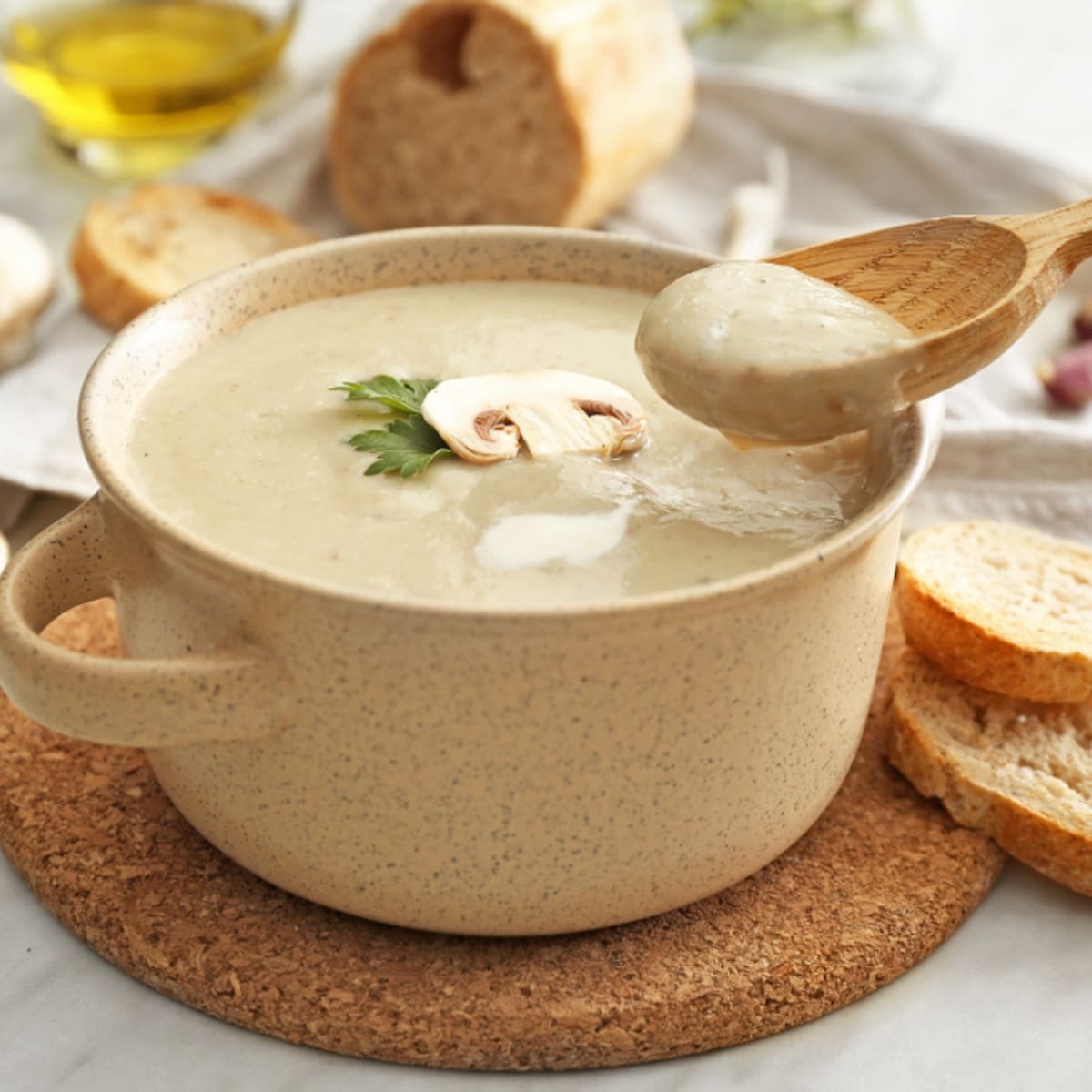
How to Thicken Soup
Sometimes, you want a brothy soup. Other times, you crave a thick base. For the latter, you will often need a thickening agent.
A thickener can do wonders for chunky and creamy soups. But choosing the right one is not always easy.
Fortunately, you have several options. Here are my top recommendations to help you find the right one.
1. Add Cornstarch or Flour
Cornstarch and flour are tried-and-true methods for thickening soup. And they work in the same way.
The only real difference is the quantities: you need less cornstarch than flour.
A general guide is this:
- Cornstarch– use around 1 tablespoon of cornstarch per cup of liquid.
- Flour– use 1 tablespoon of all-purpose flour per 1/4 cup of liquid.
As you can see from the amounts, cornstarch is a more powerful thickener.
And you need less of it! So it is less likely to alter the taste of your dish.
That said, the method for using each is the same. And it all starts with a slurry.
A slurry is a simple mix of starch and cold water. The idea is to dissolve the starch- rather than adding powder straight into the soup.
That way, you will not have any lumps!
This is how to make and use a slurry:
- Measure the starch and add it to a small bowl.
- Add cold water and stir with a fork or small whisk until smooth.
- Pour a small amount of the slurry into the soup and stir.
- Add more as needed, but give the soup time to thicken between additions.
You can see the soup thicken within a few minutes. Just keep in mind that it needs to be hot for this to work!
2. Make a Roux
A roux is a classic thickener.
In fact, some soups like gumbo and seafood bisques require it. And those are some seriously dark roux!
The name sounds fancy, but making it is super easy. All you need are equal amounts of flour and fat.
This is how to make and add a roux:
- Melt 1/4 cup cooking fat (usually butter) in a saucepan on medium-low heat.
- Add 1/4 cup flour and stir constantly for about 3 minutes. The roux should be light brown and puff slightly.
- Pour a small amount of the roux into the soup and stir to combine.
- Give it several minutes to thicken, and add more as needed.
Butter is the primary go-to option. Cooking oil, ghee, bacon fat, and other meltable fats work, too.
Choose one that will complement the flavors of your soup. Then, add it to a saucepan with equal parts all-purpose flour.
You want to stir continuously until the fat absorbs the flour.
The longer you cook the roux, the darker it gets. But the less thickening power it has.
The upside to that is the roux will develop a pleasant, nutty flavor.
3. Add Dairy
Dairy is an excellent choice if you need to thicken a creamy soup. Not only will it add to the consistency, but it’ll make it extra rich too.
Of course, you cannot add anything and expect magic to happen.
After all, almond milk is thin and watery. So, if you add that to your soup, it will water it down even more.
Instead, use a high-fat content diary, like cream of coconut or heavy cream. These will give you the best results.
Also, remember that dairy often curdles when warmed.
So be sure to start with room-temperature cream. You can even heat it a little before adding it to the pot.
This is how to use dairy to thicken soup:
- Turn the heat off and remove the soup pot from the stove.
- Add a small amount of high-fat milk or cream.
- Stir well, then add more as needed.
If you add the dairy too early, it will likely curdle. Instead, add it right at the end when the soup is no longer bubbling.
I like heavy cream for richness, though half-and-half works in a pinch. Buttermilk and yogurt also add a nice creamy consistency and tangy taste.
For a vegan option, go with full-fat coconut milk.
4. Add an Egg
Do you have some eggs on hand? Great, use one to thicken your soup.
Here is how to add an egg:
- Beat the egg whites and yolk together in a separate bowl.
- Next, add approximately one ladle of hot broth or soup to the egg.
- Whisk until combined, then slowly mix it into the soup.
Be careful not to boil the soup at this point. Like dairy, the egg can curdle.
The egg will add some flavor. So it is not the most universal method. But it can add a complementary taste to lemony soups.
5. Puree the Vegetables
Here’s a life hack for you- puree part of the soup!
Blending vegetables creates a nice, thick consistency. It does not add any extra fat or gluten. And it will not change the flavor.
For an extra thick vegetable soup, you can puree the whole thing. If you only want to thicken the broth, only puree a portion.
This is a general guide on how to puree vegetables to thicken soup:
- Transfer 1 cup of the cooked vegetable soup to a blender.
- Blend until the vegetables reach a pureed consistency.
- Pour the vegetable puree into the soup and stir. Repeat as necessary to achieve the desired consistency.
A blender is the easiest way to puree only a portion. You can transfer the soup to a bowl and use an immersion blender.
Want to add meat? Puree a portion of the vegetables first. Otherwise, it may give your soup an odd texture.
The longer you puree, the smoother the consistency of the thickener.
6. Whisk In a Beurre Manié
Never heard of beurre manié? Fear not! Like roux, the name is fancy, but the process is beginner-friendly.
Beurre manié (bur-man-yay) also involves using equal parts flour and fat. The difference is you add the mixture towards the end.
Here is how to make and use beurre manié to thicken soup:
- Mix room-temperature butter with flour until you get a paste-like texture. The flour should be well incorporated with the butter.
- When the soup is almost done, mix in the beurre manié. Continue to stir until the beurre manié is fully incorporated.
Add it at the end so the mixture does not cook. Also, less is more. So, add a little at a time.
Since your soup is almost ready, you do not want to overdo it. Otherwise, it is harder to make adjustments.
7. Add Bread
Bread is also a fantastic soup thickener. Just take it from gazpacho.
The starches give the soup more body, creating a thicker texture. Sort of like how cornstarch and flour do.
But don’t just stir in a slice of white bread and call it a day! The soup needs time to break down the starches and thicken.
This is how to incorporate bread into your soup properly:
- Break up the bread into crouton-sized pieces.
- Add 1 tablespoon of bread to the soup. Stir and repeat as necessary.
You can also use a blender if making a pureed soup like gazpacho.
8. Blend In Nuts
If dairy is not an option, use nuts. You can blend nuts like cashews and almonds to create a nut cream.
It thickens like dairy, and it’s lactose-free.
Here is how to blend nuts into soup for thickening:
- Add 1/2 cup of nuts with 1 cup of water to a blender.
- Blend until smooth.
- Pour the nut cream into the soup and stir.
Add more or less water for a thinner or thicker nut cream.
This is a prime option for creamy vegan soups like cauliflower or tomato. It is also good if you want a protein boost.
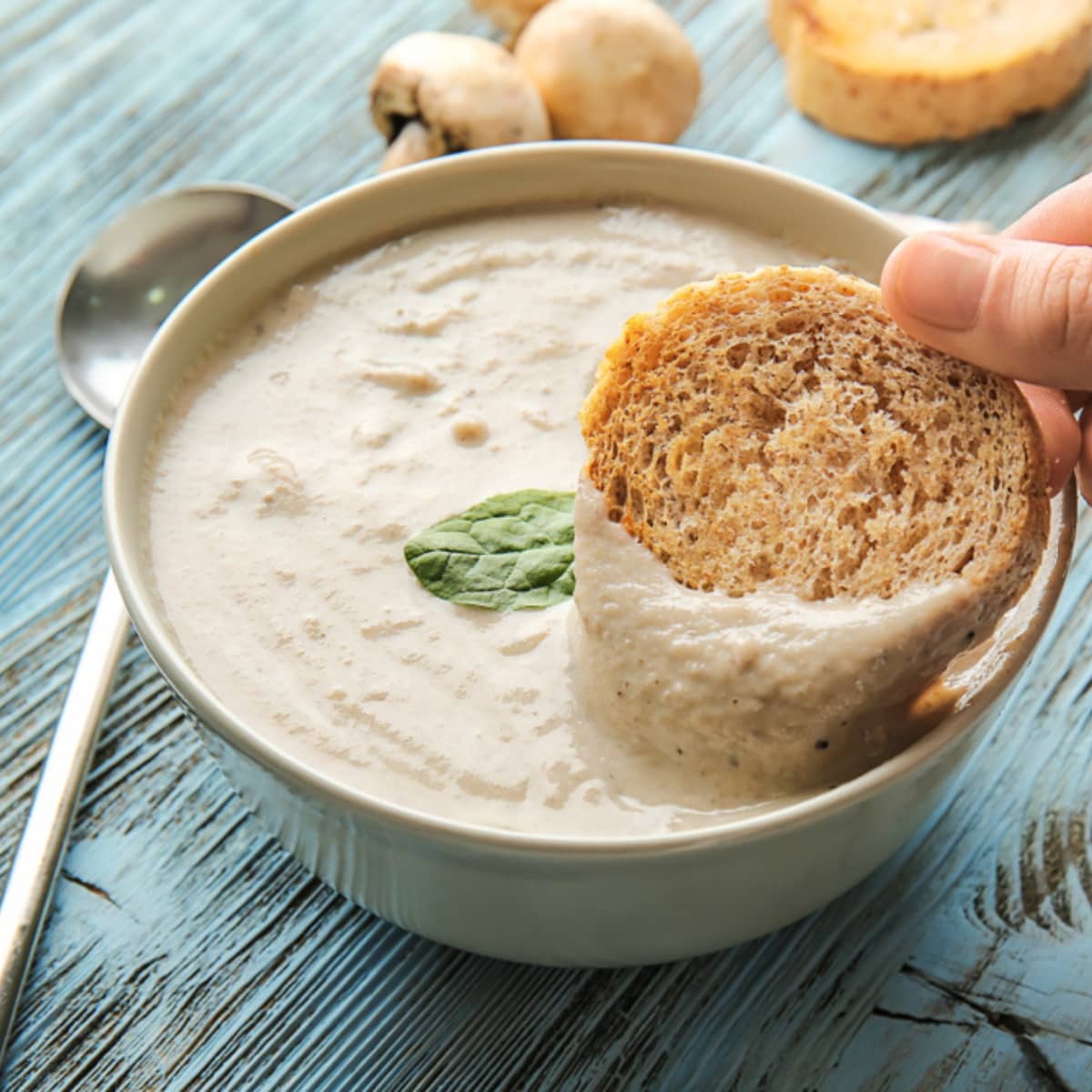
Is It Better to Thicken Soup With Flour or Cornstarch?
Flour or cornstarch, which one should you use? This is a common question any soup lover will face.
Like many things, the answer is it depends.
Cornstarch is best when you have a lot of soup to thicken.
It thickens more readily than flour, so you need less of it. Also, it does not clump easily, and it yields faster results.
Plus, you will not taste it in the final dish.
So, your best bet is cornstarch if your soup is thin. Or if you have a huge pot.
Flour is best for small amounts.
You will need more flour to thicken the soup. However, you’ll taste it if you add too much.
So, it is only the one to choose for quick fixes in small pots.
But flour is the way to go if you cannot have a lot of corn in your diet.
Keep in mind:
- White flour and cornstarch are both highly processed. So they offer nothing in the way of nutrients.
- White flour and cornstarch are both readily available and inexpensive. You won’t save too much time or money using one over the other.
Does Soup Thicken Best Cover or Uncovered?
I’ve tried to thicken soup both with and without a cover. What I found is that a lid helps trap moisture.
This is excellent for melding flavors but not so great for thickening. Less moisture will evaporate with a lid on.
The final answer? Soup thickens best without a lid.
And the longer you cook, the more the liquid will evaporate. Soon, you will have perfectly thickened soup!
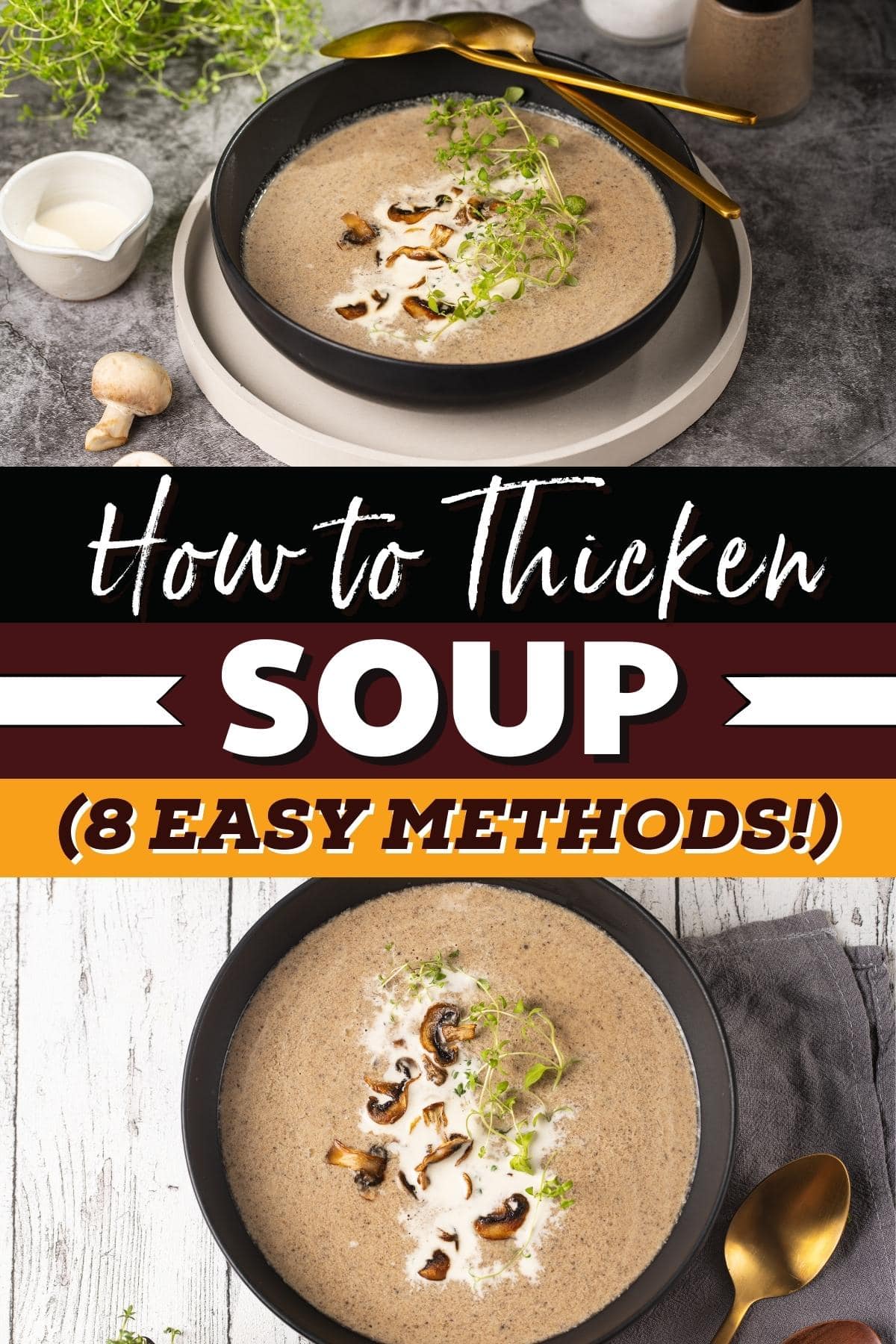

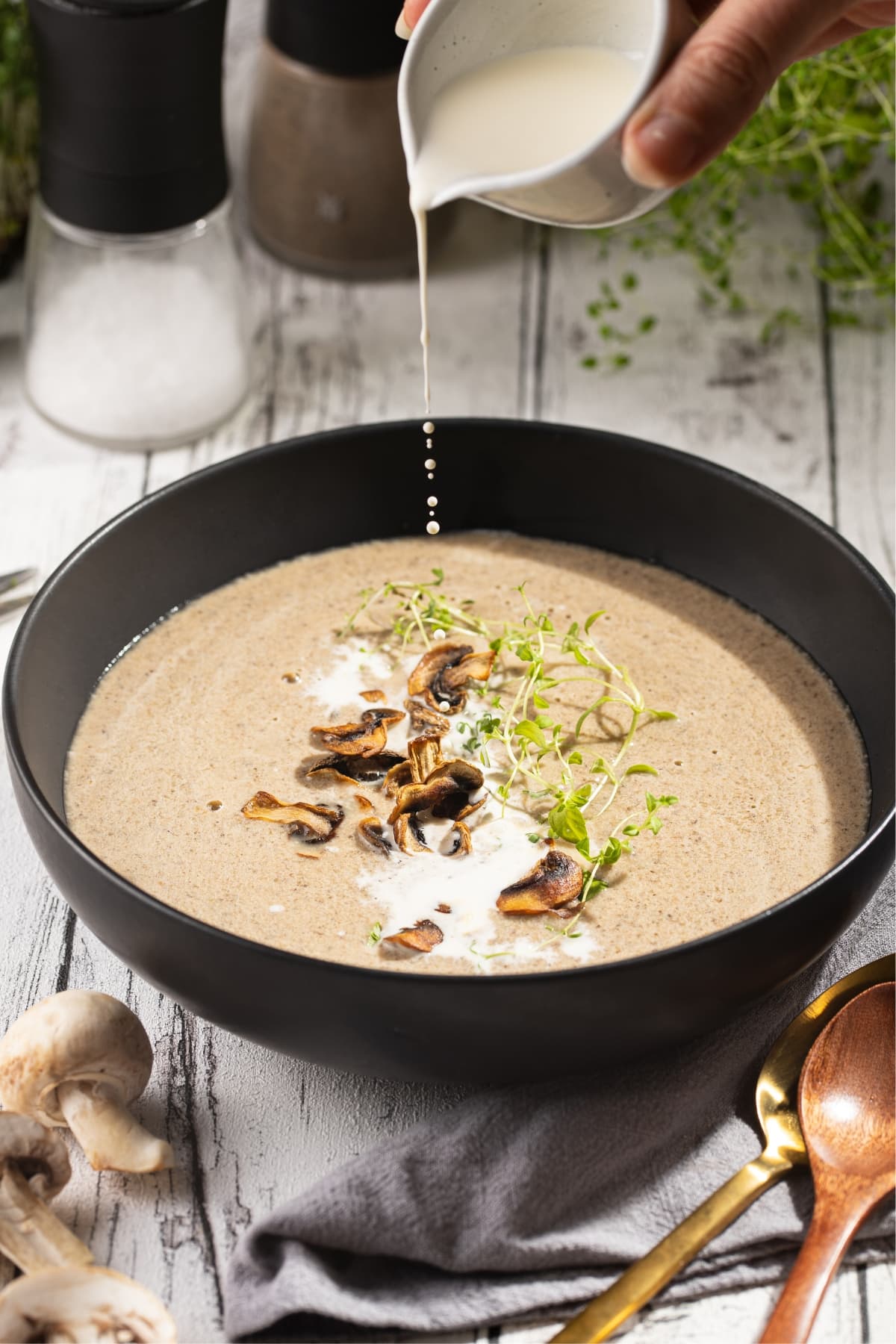


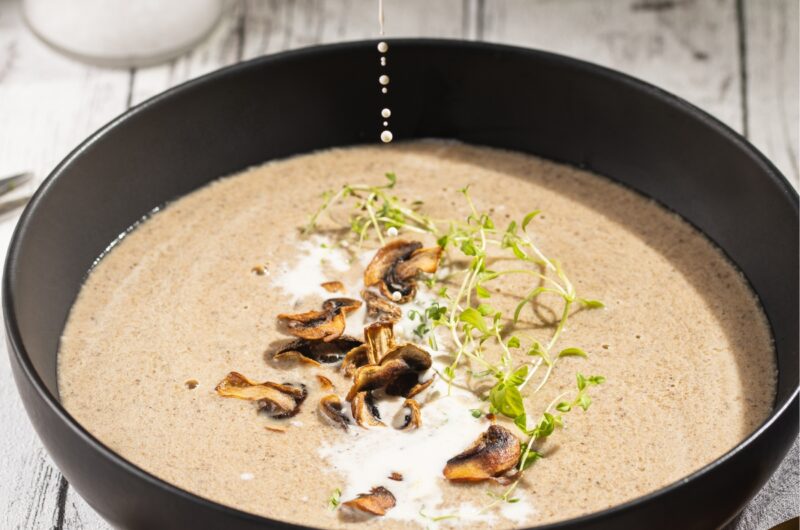
Instant mashed potato flakes is a great thickening agent.
Hi Becky, I totally agree! It works like a charm.
why does this say there are 8 easy methods for thickening soup but only one given … the 1 cup water to 1Tb cornstarch?
Hi Toni!
You’ll find all 8 methods in the post, but we included the easiest in the recipe card 🙂